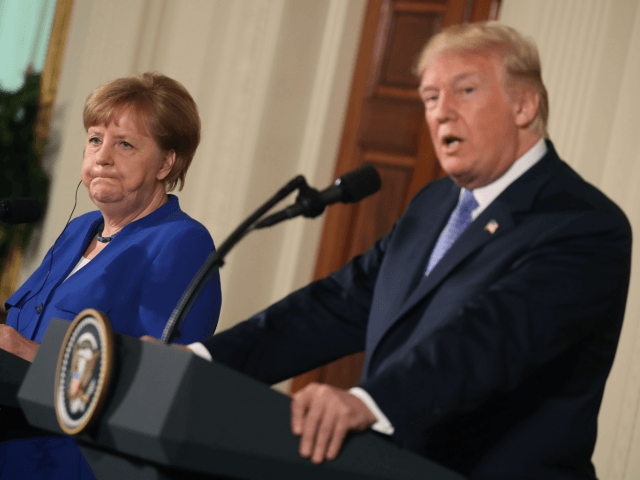The approval of the Nord Stream 2 pipeline from Russia is outgoing German Chancellor Angela Merkel’s “biggest mistake”, the former president of the EU Council said in comments backing up warnings from former President Donald Trump.
In a press conference on Sunday, former President of the European Council Donald Tusk said that Angela Merkel was “helpless” in the face of lobbying efforts from German industry to approve the controversial Nord Stream 2 pipeline, which is set to deliver gas to Germany from Russia in a pipeline along the bottom of the Baltic sea.
“As Chancellor of Germany, Angela Merkel was helpless in the face of the lobbying force of domestic entrepreneurs,” Tusk said, claiming that the outgoing leader of Germany “admitted” as much in past conversations with him.
The former Polish prime minister — now the leader of the opposition — went on to say that Merkel’s willingness to become dependent on Russian gas will go down as one of her “biggest mistakes,” according to the Polish news outlet PAP.
“From the point of view of the interests of the European Union, Nord Stream 2 is a bad project,” he added.
Current Polish Prime Minister Mateusz Morawiecki has also taken aim at the project calling on the incoming coalition government in Germany to do “everything possible not to allow Nord Stream 2 to be an instrument in the arsenal of President Putin.”
“Nord Stream 2 is becoming a tool to blackmail Ukraine and Moldova. It is also a tool for the manipulation of energy prices,” Morawiecki said on Sunday.
Former President Donald Trump was also heavily critical of Merkel’s decision during his time in office, warning that it would result in Germany and other European nations becoming “captive” to the political whims of Russia’s Vladimir Putin, who has previously used gas supplies as a means of pressuring foreign capitals.
Mr Trump also highlighted that former Merkel’s predecessor, Gerhard Schröder — who initially approved the pipeline — has gone on to become one of the top executives for the firm which constructed Nord Stream 2.
The central critique from the former American leader, however, was that Germany — which has consistently failed to meet its NATO spending obligations — benefits from American military protection from Russia, while in turn enriching the petrol-state through purchasing its gas.
“It is very sad when Germany makes a massive oil and gas deal with Russia, where we’re supposed to be guarding against Russia, and Germany goes and pays out billions and billions of dollars a year to Russia. We’re protecting Germany, we’re protecting France, we’re protecting all of these countries,” Trump said in 2018.
In stark contrast to the Trump administration, President Joe Biden said that he would not sanction the pipeline, claiming that it would be “counterproductive” to diplomatic relations with Europe. In July, Merkel secured a deal from Biden to waive existing sanctions on the project in return for green energy spending in Ukraine — one of the countries being sidestepped by the pipeline.
In the agreement, the United States maintained the right to impose sanctions should it be determined that Russia was using the pipeline to exert political pressure.
Republicans in the US Senate are currently trying to force through new sanctions on the pipeline, in an amendment to the annual defence spending bill — a vote on which is expected this week.
According to leaked documents obtained by Axios, German officials have attempted to dissuade the senators, claiming that such a move would “weaken” America’s standing in the world and “ultimately damage transatlantic unity.”
Earlier this month, Germany’s energy regulator, the Federal Network Agency (Bundesnetzagentur), announced that it would suspend the approval of the Nord Stream 2 pipeline, claiming that the company would need to open a physical office in Germany to meet its legal obligations.
Some have accused Russia of holding back increases in gas supplies during the recent energy crunch throughout Europe, however, Mr Putin has denied that he is using energy as a means of political pressure.
Follow Kurt Zindulka on Twitter here @KurtZindulka

COMMENTS
Please let us know if you're having issues with commenting.